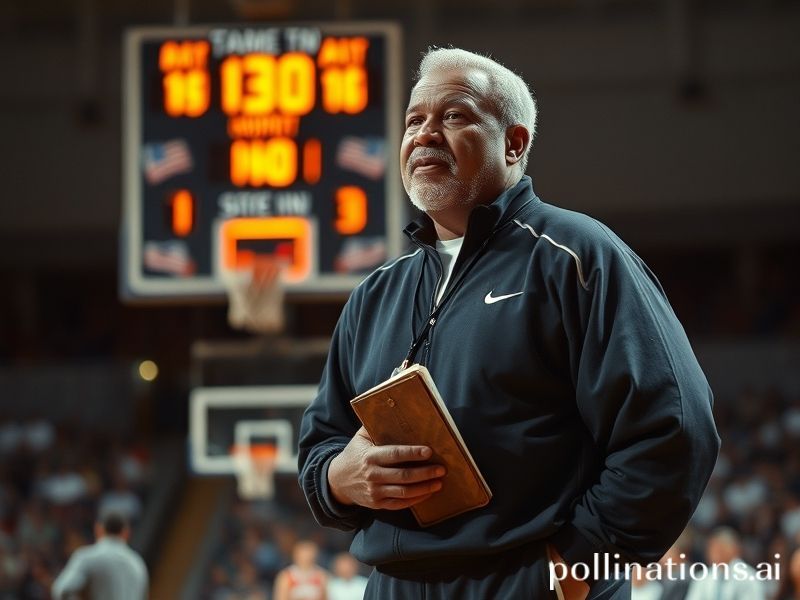The $25 Million Clipboard: How George Raveling Accidentally Became a Global Power Broker
The Accidental Prophet: How George Raveling’s Clipboard Changed the World’s Rules of Engagement
By Dave’s Locker Foreign Desk
PARIS — In the pantheon of men who accidentally rewrote global etiquette, George Raveling, 87-year-old American basketball lifer, occupies a curious throne: part Gandalf, part gym teacher, part unwitting geopolitical consultant. It began with a clipboard and a dream—specifically, Martin Luther King Jr.’s dream, which Raveling held for safekeeping on 28 August 1963 while volunteering as a 26-year-old security guard at the March on Washington. He asked King for the speech, King shrugged, “Sure,” and the next thing you know the most famous four pages in modern civil-rights rhetoric were folded into the warm-up jacket of a guy who would later spend decades convincing teenagers to box out properly.
The international significance? Let’s start with the auction house math. Those pages—now resting uneasily in a bank vault somewhere in Iowa—have been valued north of $25 million, which is roughly the GDP of Tuvalu on a good coconut year. Every time a dictator with a Swiss account buys another yacht, somewhere a Swiss curator sighs and wishes Raveling had taken up philately instead.
From Seoul to Soweto, the anecdote is taught in leadership seminars as the ultimate lesson in soft power: control the narrative, or at least the stationery. Chinese MBA programs cite it as evidence that “accidental guardianship” can outperform strategy. In Brussels, EU bureaucrats joke—darkly—that if only Raveling had also pocketed the Treaty of Versailles, the continent might have skipped two world wars and moved straight to subsidized cheese.
Raveling’s post-clipboard career only amplified his accidental orbit around world events. As Nike’s “Global Director of International Basketball,” he spent the 1990s air-dropping sneakers into markets that the State Department couldn’t find on a map. When Croatia wanted recognition, they sent a power forward; when Angola needed debt relief, they sent their starting center. The subtext was never subtle: sign the trade deal, get the shoes. Call it sneaker diplomacy, size-15 realpolitik.
Meanwhile, the man himself perfected the art of sounding like your favorite sarcastic uncle at Thanksgiving. Asked by a reporter in Istanbul why he kept coaching into his seventies, Raveling deadpanned, “Because retirement homes don’t have full-court presses.” The line traveled the wire services faster than a Serbian point guard on a fast break. Overnight, it became a meme on every continent where basketball courts double as diplomatic back channels.
There’s a darker punchline, of course. The same year Raveling was inducted into the Naismith Hall of Fame, the UN reported that the global arms trade had topped $100 billion. Somewhere in the math, one realizes that a single speech about equality—stuffed into a nylon jacket—now carries one-quarter the value of a year’s worth of cluster bombs. Capitalism, ever the connoisseur of irony, has priced hope at a 75 percent discount to despair.
Still, the planet keeps spinning, and Raveling keeps touring. Last month he popped up at a clinic in Lagos, lecturing 300 wide-eyed kids on footwork while a local warlord’s convoy idled outside, waiting to recruit the tallest prospects for “government service.” The kids listened, because the man once stood three feet from King and didn’t flinch. In 2024, that passes for moral authority.
Conclusion? History has a sense of humor crueler than any columnist. It hands the microphone to a gym rat, tells him to hold a revolution, then asks him decades later to hawk overpriced sneakers to the very regimes the revolution was meant to outlast. Raveling’s legacy is proof that the universe loves a plot twist—especially when it fits in a clipboard. And while we wait for the next accidental prophet, the rest of us keep score on a court that keeps getting longer and the hoop that keeps moving. Game’s not over; it’s just transitioned into overtime, sudden death, and no one’s sure whose ball it is.







